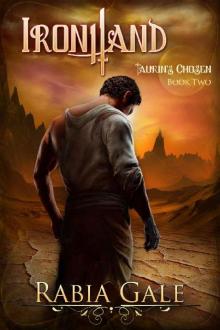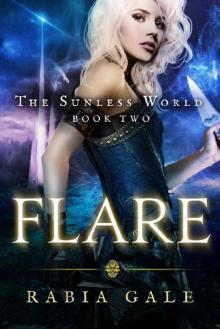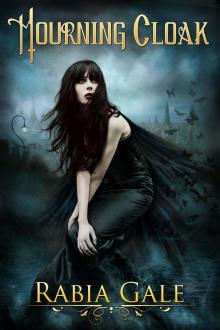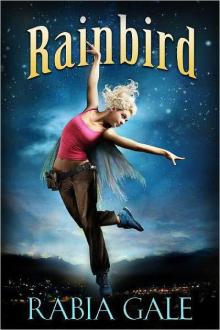- Home
- Rabia Gale
Ironhand (Taurin's Chosen Book 2) Page 3
Ironhand (Taurin's Chosen Book 2) Read online
Page 3
“A squatter!” pipes up a cobble cruncher, only to be shouted down by its fellows. “Na, a scuttler!” “A squeaker!”
I nod at Leap. He wades into the group, grabs a bunch of the stalky legs in one hand, and lifts. Cobble crunchers leap and fall off, and soon Leap is left holding a—
A machine.
It’s made of brass and iron, like the golems. It’s part-crab and part-spider, with many-jointed limbs, eyes on stalks, a shell.
It twists in Leap’s hand. Legs snap.
The creature flies through the air, lands on a wall. It scuttles up, as Leap throws away the severed limbs and pounces. Cobble crunchers boil up the wall, but the thing is too quick. It’s at the top of the wall and squeezing through a gap I could’ve sworn was too small for it.
Cobble crunchers pursue it, but Leap looks at me, a grimace twisting his face.
“The bugger’s too fast, Ironhand.”
Kunj issues a stream of what could only be invectives and spits on the floor.
I look at the gap where the thing disappeared, feeling as if it’d just skittered over me.
It looked like a bigger version of the tiny spiders, those too-small-to-be-seen-by-the-eye machines, that live inside me.
I am a stain on a rock, a shadow in the desert. How long I’ve been here, I don’t know, but it could’ve been hours, days, years.
All the time in the world could’ve passed before I realized that I was not part of the landscape.
That I was I.
I feel battered and bruised, as if I’ve been whirling in the winds. Perhaps I have. There’s sand in my teeth, under my nails, between my toes. It prickles on my lashes and smears over my cloak.
The night sky above me is awash in stars. I tilt my head up and they look down at me, noting me in their distant way.
My head feels empty, as if everything I’ve held on to all my life—all memory, all faith, all thoughts—has poured away like handfuls of sand falling through my fingers.
I remember nothing and I do not care.
It’s enough to be alive and aware, just a small part of the scene, like the mountains surrounding the bowl-shaped valley below. Pale light scatters on white at the bottom. A steady wind blows my hair into my face, and brings with it a taste of salt on my lips.
Salt on my lips. I know this place.
Then I realize what it is, this jarring and thrumming in my bones, the vibrations in the ground.
Behind me is the Horn of Reckoning.
And it’s blowing.
I slide and skid down the slope. Urgency has set my heart thumping, though my mind hasn’t caught up to the danger yet.
And now I’m at the bottom of the valley, looking out at the salt flats. The wind’s stronger now, great swathes of it blowing all over the place like gauzy draperies. Salt’s awhirl in the air, cracks cover the surface.
I stand at the edge, on tiptoes, neck stretched out, a throb going through my entire body.
Something bad, really bad, is happening.
A movement in the salt. Something crusted with white thrusts its way through the crystals. A dark hand, as big as my own body.
Its fingers clench into a fist.
It drops like a hammer. Salt fountains up.
A head rises like a small hill. Eyes like lamps, burning orange, sweep the area.
Find me. Pin me, like a moth to a board.
Kato!
I’m on the edge of the scattering. I have to get back to Kato. Have to warn him.
But I don’t. I can’t. If I scatter again, I know I won’t be able to pull myself back together.
So I run. Feet sinking into sand, salt burning against my skin, finding rock, dragging myself up the slope, cloak catching on rocks.
I run.
Please let me not be too late!
Tremors rack Kaal Baran all night, rumbling deep beneath the foundations. I can’t sleep, so I wake Daral, gather a bunch of eerie men, and take them hunting in the early dawn.
The eerie men are strong and fast, but they waste a lot of energy in their rough play. They’re slapping backs and tripping each other and mock-fighting all the way out of Kaal Baran.
I say nothing.
Experience is the better teacher in this case.
The desert gives way to a kind of patchy grassland, dotted here and there with short trees. I point out the herd of antelope with long, straight horns, some nibbling grass, others stretching up for leaves.
I expect to direct them, but they don’t need the help, these eerie men. Gone is the loud play; they work together in a pack, surrounding the antelope, giving chase, running the animals into each other’s teeth and claws, bringing them down.
It’s the least work I’ve ever had to do on a hunt.
Daral and I watch. Every now and again they bring another antelope carcass and drop it at our feet. Leap’s keeping up a running commentary to me, “… Gash’m gunnin’… big bloater… eh, Ironhand?…” which I barely understand.
They’re meant for the open plains. How did eerie men find themselves inside Highwind? What did they hunt and eat in the city streets?
I’d never wondered about their origins or their eating habits before. In Highwind, they were just another strange creature of Deep Night—out here, they’re more real, more solid, full of leaping life and strong emotion.
But they’re used to colder climes, and as the morning wears on, they’re tired, thirsty and panting. I ration out the water, then send most of them back to Kaal Baran, an antelope on each one’s back.
There’s a lot of complaining and whimpering as they do so.
“It’s hot out here, with little water,” I tell them. “Think about how much of your strength you wasted on your way here.”
Leap chortles, still bright-eyed and brimming with life. “That’ll learn ’em!” He cuffs an underling on the head and the man staggers. “You hear Ironhand?” Leap bellows in the unfortunate’s ear. “No hi-jinxing around!”
We watch the eerie men trail fort-wards with their burdens.
I resist the urge to call out that they’re not to eat all the meat before I get back.
I’m headed out to talk to the sheepherders, with Leap showing the way. Grip’s coming because I don’t trust him running loose in Kaal Baran without me. I’d rather deal with his hostility out here than with a coup when I get back.
I put Daral in charge of scavenging a suitable blood gift. He picked out a small marble statuette of a bird, still in good shape, though you could see where it had cracked off from a relief, a box of Highwind matches, and a bottle of perfume that had been among Sera’s things.
I said nothing as he wrapped the whole lot in a poly groundsheet. I had boxes of Sera’s things back in Highwind. I’d held on to the scent of her, the smile and sight of her, as a miser hoards gold.
It was time to let her go. She’d left me behind a long time ago.
Daral’s all in flowing white, a cotton scarf wrapped around his mouth and nose. He walks the desert with ease, the pack of gifts strapped to his back.
He’s not city-bred, nor from the plains. He’s slight, with browner skin than those from the east. He’s desert-born, I’d wager.
“Why you?” I ask him. “A bataur goes out and the only one who comes is you?”
“The scholars at the university were curious, but not enough to take on the rigors of the journey. As a junior scholar, I could hardly turn down the privilege of being their delegate.”
“And your familiarity with the desert made you a good choice, too.”
He assents with a slight nod of his head.
“Your coming was in vain, though.”
Daral’s gaze flicks toward the eerie men ranging on either side of us. “No,” he says, thoughtfully. “I wouldn’t say that. For a scholar, there is no situation that he cannot take something away from.”
That mild acceptance worries me more than raging or panic. I want to like him—he reminds me of Toro—but I cannot bend my mind toward him.
We’re into the Painted Rocks now, a series of hills splashed in rainbow colors. Bands of pink, green, and blue stand out against the bright sky, like a petrified sea. Narrow valleys snake their way through the hills, overhung with red and orange rock. Scrub covers the rock.
Leap jumps down from an overhang. “Not far now!” he says, showing pointed teeth and metal fillings. He bounds away, followed more slowly by Grip.
Still wasting energy. I decide not to waste mine by calling after him. I heft my water skin. About a quarter full, and there’ll be water at the nomads’ camp.
We climb yet another slope. Leap’s already at the top, scenting the air. He shouts down at me. “… sniff scent… flesh rot…”
Daral looks at me, uncomprehending.
My face has become a stone mask.
“He says he smells dead flesh.”
They’re dead, the nomads on the other side of the hill. They lie in a sprawl of limbs, men and women and children all, vacant eyes turned up toward the sky. The kiln-baked wind stirs their robes and the entrance flaps of their pale animal-skin tents. A piece of laundry, freed from under the rock that weighed it down, tumbles through the silent camp.
A desert canine sniffs around a corpse. Leap pounces toward it, and it skitters away into the thorn bushes. A carrion bird pecks at another body; Leap catches a handful of feathers before it flies away.
I squat next to the nearest body—an older man, with a face browned from sun and seamed with hard living. His face is untouched by violence.
I examine his body. Rows of small holes pinprick his chest. Tiny rust-colored spots stain the cloth.
“Eldritch guns.” I sit back on my heels. “Highwind was here.”
Daral takes a quick breath. “Highwind. But why—?”
“They helped Sera. They gave her an army, funded her research, equipped her with weapons and supplies. They didn’t do it out of the goodness of their hearts.” My mouth is a twist of bitterness. “They wanted something.”
“But what?”
I point to tracks in the thin soil—parallel diamonded treads leading away from the camp.
Daral looks as well. “The only thing that way is…”
“Yes. Makai Crater.”
We fill our water skins from a tiny stream gurgling out from a crack in the rock, sheltered by an overhang. The eerie men lap at it, water spattering over their faces and clothes. Daral and I heave corpses into a narrow crevasse. Heat shimmers above the rock; it sucks both water and strength out of me, leaving me light-headed.
The eerie men could’ve done the job, but it feels wrong to let them.
These are our people. We bury them.
Daral murmurs itauri prayers over each body. I make the ritual gestures, but the words are stuck in my throat.
Leap and Grip help roll stones into the crevasse. We cover the bodies as best we can, to keep the scavengers from getting to them.
By the time we finish, it’s past midday and the sun is burning in a sky bleached white as bone. I tell the eerie men to wait for us in the encampment; both are subdued and make no protest. Leap throws himself down in what little shade he can find, Grip sitting cross-legged beside him. Both pant harshly, their energy sapped.
I give them one last look. Is one of them a Highwind spy?
Daral and I follow the tracks of the Highwind vehicles, ground into the thin covering of dirt, across the broken landscape. Brown and yellow lizards drowse in the shelter of large rocks. Uprooted and battered thorn bushes bear silent testimony to the passage of Highwind vehicles.
“We can take a short cut through here.” Daral points to a narrow pass higher up. “Looks like these tracks are taking the long way, through the canyon. And we’ll be able to see more from up high.”
I nod, fatigued. My years in Highwind have weakened me. I can no longer bear the oppressive heat the way I used to.
I long for the plains of my childhood, for the wind that whistled through the grasses, turning them into a sea of emerald waves.
From the top of the pass, we see the Painted Hills whittled down to mere stubs, discolored broken teeth in the jaws of the desert. Canyons cut deep through the hills and across the rocky plain, radiating out from the great crater that scars this corner of the desert.
Makai Crater. Angel Crater.
The site of a mythic battle between angels and demons, back in a past full of mist and darkness. All the surrounding land slopes down towards it, hills pitching forward, the plains rolling down to the center. The crater walls form a cracking, crumbling bowl. At the bottom, surrounded by rubble, is a small dark lake, reeking of sulfur.
They say the lake is bottomless.
My people leave the crater alone. It’s not exactly a holy place, but an awesome, uncomfortable one, reminding us that once giants, both good and evil, strode the land.
It’s been violated.
The sun strikes bright flashes on steel—vehicles hitched to giant ground worms, hoisting machinery, the barrel of an eldritch gun. White-roofed shelters stand out against the unrelenting brown, and tiny black figures, miniaturized by the distance, move against the backdrop.
Most of the activity is around the site of the lake.
The former lake, I should say. No longer a dark circle, a concentrated dot of silence and mystery. Its waters are spilled all over the broken rock, painting them a dark brown. Tiny rivulets run like capillaries across the crater floor from the punctured lake. The lake lies dying, gasping, its insides now outside, turned clear and transparent in the sun.
Daral mutters a curse. His body tenses.
I put my hand on his shoulder and squeeze, hard.
Daral looks at me with burning eyes. “What shall we do?”
Two men, one with a missing hand, and two eerie men, who may or may not be on our side?
Easy.
“We leave,” I say. Then, as there’s a shift in the air around us, a movement, “Watch—” Adrenaline surges; my spiders respond weakly.
Daral drops into a crouch, hands near his sleeves, as figures swarm into view.
We recognize them at the same time. “Baradari,” says Daral, but he doesn’t relax, doesn’t straighten.
I unsheathe my sword, hold it up for the men to see. “I am Kato Vorsok,” I say. There are other formalities, but I can’t bring myself to say them. Not anymore. “Who is your chief?”
Within their hoods, above their covered mouths, I see the men’s eyes widen. There are five of them, but baradari work in bands of seven. Where are the rest?
One steps forward, bends his neck in a perfunctory bow. “We are baradari under Khan Mehmet of the Hawks, khaleesa.” He uses a respectful title, but once these same men would’ve called me Khalan.
“The hothead,” murmurs Daral in my ear. I nod. I know the man. “I heard that he was removed from his position as Bolar’s war-chief.” Not surprising, that, considering the temperaments of the two men.
“What are the baradari of Khan Mehmet doing so deep in the Painted Hills?” I ask, sheathing my sword, keeping up my arrogant air, as if I have perfect right to ask the question.
By the customs of the itauri land, I do. Both my confidence and the conventions work to erode the baradari’s mistrust. “We go after the blasphemers.” He points toward the Crater, and spits his disgust on the ground. A grave insult in this parched land. “And their creatures.”
He crooks his fingers and, after a bit, the remaining two baradari arrive on the scene, half-carrying, half-dragging their furry, struggling captive.
I keep my face as still as a mask. Daral’s shoulder’s twitch—is he laughing, curse the man?
The baradari dump their burden near me, hold him down.
“This one is mine,” I tell their leader. He hides his surprise, nods, gestures his men back.
Leap struggles to his feet, spitting out the gag, making faces. “Sorry, Ironhand,” he rumbles. “Got careless.”
“Where’s Grip?” I ask.
“Eh, wen
t back to the fort before’n white clothes showed up.” Leap shrugs.
Sowing discord as we speak, probably. “You said going after the blasphemers.” I turn my attention back to the baradari leader. “Mehmet will attack them at the crater.” It’s not a question. Beside me, Daral lets his breath out in a hiss.
The baradari leader says, “You will join us, khaleesa?”
“Your camp for the night, yes. And then you can tell Khan Mehmet that I am at Kaal Baran, and he is welcome to seek shelter there.”
“You don’t think they can win against Highwind,” remarks Daral early the next morning. We left the baradari scouts’ camp before dawn, and hiked in silence across the desert, Leap loping ahead of us. It isn’t until the dark bulk of Kaal Baran comes into view that Daral speaks.
“It’ll be a bloody massacre,” I say. “Mehmet’s stubborn, though, and he’s the type who needs to bash himself against a rock a time or two before he’ll listen to reason. We’ll still be here when he’s ready to talk to us.”
Long shadows of charcoal-grey stretch out across the rock. A wail goes up into the air—Screech on duty again.
I frown. I should’ve told Bound to take her off the sentry duty roster.
If Flutter had been there, she’d have swapped Screech out.
I glance over the desert, probing the shadows, hoping that one of them will move, rise, form into Flutter.
Nothing.
Screech warbles overhead as we enter the narrow archway. My frown deepens.
Where are the guards?
And then I hear them—the yelps and yowls and battle cries. The crash of metal against metal, the thump of flesh against flesh.
I run into the courtyard. Eerie men and cobble crunchers are in a free-for-all brawl. Right in front of me, a cobble cruncher sinks its teeth into an eerie man’s ankle. The eerie man howls and kicks, sends the cobble cruncher flying into the air.
I was gone for one day. Only one day.
Cloud drifts past, and I grab her arm. “What’s going on?”
She shrugs, and her sleeve and arm mist out of my grasp. “The cobble crunchers accused the eerie men of stealing their canned worms. The eerie men said that the cobble crunchers tunneled too close to the well walls, and now there’s midden in the water. Then one of the crunchers bit an eerie man’s nose and matters rapidly deteriorated from there.

 Ironhand (Taurin's Chosen Book 2)
Ironhand (Taurin's Chosen Book 2) Flare: The Sunless World Book Two
Flare: The Sunless World Book Two Ghostlight (The Reflected City Book 1)
Ghostlight (The Reflected City Book 1) Mourning Cloak
Mourning Cloak Rainbird
Rainbird